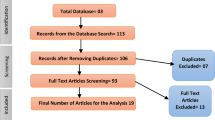Abstract
A case of recovered memory of childhood trauma is reported with documented sexual trauma in early childhood, chronicled evidence of the absence of memory for traumatic experience over a period of time, and substantial evidence of ‘spontaneous’ recovery of memory. This account contains the first available prospective report of memory loss in a case in which there is both documented evidence of trauma and evidence of recovery of memory. The case emerged as part of a broadband, large-scale study of children followed closely from birth to adulthood which was not focused on memory for trauma. Prospective data gathered in a neutral research context, corroborated and supplemented by retrospective information, circumvent many limitations of previous retrospective accounts of recovered memories.
Similar content being viewed by others
References
Alpert, J. L., Brown, L. S., Ceci, S. J., Courtois, C. A., Loftus, E., & Ornstein, P. A. (1996). Final conclusions of the APA working group on investigation of memories of childhood abuse. Washington, D.C.: American Psychological Association.
Baker-Ward, L., Gordon, B. N., Ornstein, P. A., Larus, D. M., & Clubb, P. A. (1993). Young children's long-term retention of a pediatric examination. Child Development, 64, 1519–1533.
Briere, J., & Conte, J. R. (1993). Self-reported amnesia for abuse in adults molested as children. Journal of Traumatic Stress, 6, 21–31.
Chambers, W., Puig-Antich, J., Hirsch, M., Paez, P., Ambrosini, P., Tabrizi, M. A., & Johnson, R. (1985). The assessment of affective disorders in children and adolescents by semi-structured interview: Test-retest reliability of the K-SADS-P. Archives of General Psychiatry, 42, 606–702.
George, C., Kaplan, N., & Main, M. (1996). Adult attachment interview. Unpublished Manuscript, Department of Psychology, University of California, Berkeley (3rd edition).
Handford, H. A., Mayes, S. D., Mattison, R. E., Humphrey H. F. J., Bagnato, S., Bixler, E. O., & Kales, J. D. (1986). Child and parent reaction to the three mile island nuclear accident. Journal of the American Academy of Child Psychiatry, 25, 346–356.
Holst, V. F., & Pezdek, K. (1992). Scripts for typical crimes and their effects on memory for eye-witness testimony. Applied Cognitive Psychology, 6, 573–587.
Loftus, E. F. (1993a). Desperately seeking memories of the first few years of childhood: The reality of early memories. Journal of Experimental Psychology: General, 122, 274–277.
Loftus, E. F. (1993b). The reality of repressed memories. American Psychologist, 48, 518–537.
Loftus, E. F., Levidow, B., & Duensing, S. (1992). Who remembers best? Individual differences in memory for events that occurred in a science museum. Applied Cognitive Psychology, 6, 93–107.
Loftus, E. F., Polonsky, S., & Fullilove, M. T. (1994). Memories of childhood sexual abuse: Remembering and repressing. Psychology of Women Quarterly, 18, 67–84.
Person, E. S., & Klar, H. (1994). Establishing trauma: The difficulty distinguishing between memories and fantasies. Journal of the American Psychoanalytic Association, 42, 1055–1081.
Puig-Antich, J., & Chambers, W. (1978). The Schedule for Affective Disorders and Schizophrenia for school-aged children. New York: New York Psychiatric Institute.
Putnam, F. W., & Trickett, P. K. (1993). Child sexual abuse: A model of chronic trauma. Psychiatry, 56, 82–95.
Rosen, V. (1955). The reconstruction of a traumatic childhood. Journal of the American Psychoanalytic Association, 3, 211–221.
Sandberg, D., Lynn, S. J., & Green, J. P. (1994). Sexual abuse and revictimization: Mastery dysfunctional learning, and dissociation. In S. J. Lynn & J. W. Rhue (Eds.), Dissociation: Clinical and theoretical perspectives, (pp. 242–267). New York: Guilford Press.
Spiegel, D. (1986). Dissociating damage. American Journal of Clinical Hypnosis, 29, 123–131.
Terr, L. C. (1983). Chowchilla revisited: The effects of psychic trauma four years after a school bus kidnapping. American Journal of Psychiatry, 140, 1543–1550.
Usher, J. A., & Neisser, U. (1993). Childhood amnesia and the beginnings of memory for four early life events. Journal of Experimental Psychology: General, 122, 155–165.
Williams, L. M. (1994). Recall of childhood trauma: A prospective study of women's memories of child sexual abuse. Journal of Consulting and Clinical Psychology, 62, 1167–1176.
Williams, L. M. (1995). Recovered memories of abuse in women with documented child sexual victimization histories. Journal of Traumatic Stress, 8, 649–673.
Author information
Authors and Affiliations
About this article
Cite this article
Duggal, S., Sroufe, L.A. Recovered Memory of Childhood Sexual Trauma: A Documented Case from a Longitudinal Study. J Trauma Stress 11, 301–321 (1998). https://doi.org/10.1023/A:1024403220769
Issue Date:
DOI: https://doi.org/10.1023/A:1024403220769




